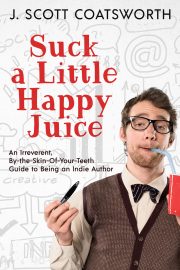Message to New Writers: It’s Okay to Focus on Your Craft
by Monica Valentinelli
 On the heels of yet another discussion about whether or not success is attainable in today’s ever-changing publishing industry, I’d like to offer the following to new writers: there is absolutely nothing wrong with focusing on your craft. You don’t have to worry about the state of the publishing industry and your place in it.
On the heels of yet another discussion about whether or not success is attainable in today’s ever-changing publishing industry, I’d like to offer the following to new writers: there is absolutely nothing wrong with focusing on your craft. You don’t have to worry about the state of the publishing industry and your place in it.
Before I proceed, let me clearly state that I feel no two authors are alike and no two paths to (and within) the publishing world are the same. Your path and experiences will probably differ from mine. Every author’s story is unique. You may recall the story of bestselling author Pat Rothfuss, just as one example. (Go Pat, Go!) Amanda Hocking as another. This article is not meant to suggest that you are doing anything wrong by worrying about the news. Rather, I’m bringing a few touchy issues up because I think they are worth exploring.
If You’re Learning, You’re Learning
The mentality that you have to “get your first stories published or else” is incredibly foreign to me. I opted for an undergrad degree that allowed me to simply learn and write. Due to the flexibility of my Creative Writing program, I developed my own course requirements to focus on multiple forms of writing. While there are benefits and drawbacks to any academic program, I have no regrets: the environment allowed me to concentrate on the words I wrote as opposed to selling them.
Every time I talk to an aspiring author, they ask me what their chances are to get published and be successful. (Note: my definition of aspiring may vary from yours. When I use that word, I mean authors who don’t have a lot of experience writing, revising, critiquing, submitting, invoicing, etc.) I usually ask them about their work: what they’d written, what they like to read, what they don’t. The majority of the time I get either a blank stare or a pseudo-summary of their online presence.
Then the conversation turns into: “But what about the state of the publishing industry? Should I get an agent? Should I self-publish?”
Self-Publishing Won’t Make You a Better Writer
It blows my mind that the explosion of e-books has somehow given people the impression that either you get published through one of the big guns or you self-publish. When I ask why, usually I am barraged with a small list of self-published authors who were successful. J.A. Konrath. Amanda Hocking. David Wellington.
Although fame and fortune are attractive, there is something missing from these success stories. In her own words, Amanda Hocking once once blogged about her experiences by saying:
“There is a common misconception that I published the first novel I ever wrote, and that is not true. The first book I ever published was My Blood Approves, and that was the eighth novel I’d written.” –SOURCE: A Bit of a Reality Check by Amanda Hocking
In other words, Amanda focused on her craft and honed it to perfection before she decided to self-publish. That fact is true of many self-published authors who have found success. Yet, the attitude persists that one can simply wake up and reap the rewards.
Is there a lot of pressure on authors to get out there and explore new opportunities? Absolutely. However, I would like to suggest that just because it’s easier to get published doesn’t mean that your story will instantly become better written just because those tools are there. Or, for the short version: just because you can, doesn’t mean you should.
Self-publishing is not the only ticket to winning the proverbial lottery. In some ways, I feel the accessibility of authors online coupled with the availability of publishing news hurts the craft because it’s taking the emphasis off the words on the page.
It takes seconds to buy a book online and promote one through a Tweet. It may take weeks, months over even years to polish one so it’s ready to sell. Why wouldn’t you want to put your best plot forward?
Researching Markets Has Value When You’re Ready to Sell
There is a lot of value in researching markets and understanding what sells and what doesn’t. I don’t “chase the markets” so to speak, but knowing what people are reading helps me set a baseline expectation about what publishers and readers are going to be keen to. Market research was a factor in my decision to self-publish The Queen of Crows, which is Native American dark fantasy. If you’re curious, I talk about my experiences in The Queen of Crows: A One-Year Retrospective. Another example, are my recent sales of two stories and one non-fiction essay to Apex Publications. I’ve been reading their anthologies and magazine, and have tailored my submissions to fit the style of the publication.
This career tactic, however, is not what I’d recommend an author do if they haven’t written anything before. In fact, I wouldn’t suggest it for any writer who is not confident that they’ve got a good story to sell. There is nothing wrong with waiting until a story is ready, deadlines excluded! When you’ve got a schedule to keep or you’re not writing on spec, the game changes considerably.
Am I alone in these views? No, I’m not. I mentioned in last month’s article that many of my concerns about “what writers should be doing” have been echoed. In the newly released Starve Better: Surviving the Endless Horror of the Writing Life by Nick Mamatas, there are several down-to-earth essays and pragmatic advice to ignore what I call a “shock and awe” mentality and pay attention to your work. It’s a good read and it does take the unpopular stance, but I feel if you’re going to chase the rainbow — you need good running shoes.
Five Resources to Help Perfect Your Stories
So, of course the end all/be all question is: How do I tell a good story? Writing prompts will only get you so far; what you need is the insight that comes from being able to tell what works and what doesn’t. Before I disappear back into the wilds of the internet, I’d like to leave you with five resources you can check out.
1) Nascence by Tobias Buckell – One resource you may want to check out is the e-book Nascence by Tobias Buckell. If I was going to recommend a “learning how to write” book, I would suggest something like this because he goes through seventeen stories that didn’t work, explains why they didn’t and then proceeds to say what he had learned.
I recently had the opportunity to ask Tobias if he had any words of wisdom to share with you. Here’s what he said:
“A lot of advice you get as a writer is advice about what to do, and what not do. Rules and recommendations. But it helps to have honest examples of failed attempts to show, rather than tell, how something broke. By offering up broken stories and giving a post-game breakdown, I think some people might find the common advice given to writers a little easier to understand, and maybe less intimidating knowing that it’s okay and totally common for writers who have managed to publish stuff to fail. Sometimes spectacularly. It’s all a learning experience.” — Author, Tobias Buckell
This perspective is crucial to any writer’s revision process and I feel it’s very reassuring. Cost: ~$2.99
2) Creative Writing Now – There are a lot of links and tips on this website devoted to fiction, but one in particular may help you take a better look at your work. The how to write a story section has several topics to help you decide not only what you want to write, but look at different elements within the story itself. Cost: Free
3) Critters.org – I used to be a member of Critters.org and am thinking about getting back into it simply because group critiques are fun! I feel this particular group ensures that you’re getting the best opinion possible on your work. While every story may have mixed reactions, they’re typically on a bell curve; small percentages love or hate it, but the bulk of the critiques will tell you if you’re headed in the right direction. That’s something a smaller critique group can’t always offer. Cost: Free
4) University Extension – Many universities have some form of extension program where you can sign up for individual classes that don’t require in-person attendance. Many of these consist of a mentorship-style instruction where you write and submit through the mail. If you’re looking for feedback, this can be a good way to help you learn the nuts and bolts. Cost: Varies by credit / university.
5) Author Outreach – Many authors are extremely supportive of new writers by either conducting workshops at conventions or offering critiques of stories and samples for a small fee. Tom Piccirilli leverages Facebook to connect with readers and offers a way for aspiring writers to get critiques. The Writer’s Symposium at GenCon has read-and-critique sessions where authors like Anton Strout and Jean Rabe offer feedback. If you’re on a budget, you may want to check out this science fiction and fantasy convention resource (Thanks, Mary!) to find a convention in your area and look at their programming. Cost: Varies by author and convention.


